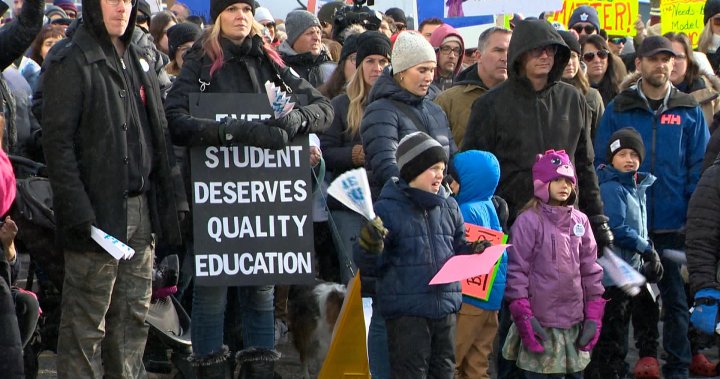
The politics behind the Saskatchewan Teachers’ Federations negotiations
Global News
The Saskatchewan Teachers' Federation (STF) will hold another one-day strike for teachers across the province on Monday. Global News took a look at the political side of the move.
The Saskatchewan Teachers’ Federation (STF) announced another one-day strike for teachers across the province to take place on Monday.
On Jan. 16, teachers in Saskatchewan went on their first strike of the year in more than 40 locations across the province, citing classroom size and complexity as the main issues they want discussed, among others.
Education minister Jeremy Cockrill said issues around class sizes are best dealt with by local school divisions as each division is likely to have respective issues. He said what the teachers are asking for is taking that decision away from school divisions.
To talk about the ongoing labour negotiations between STF and the provincial government, Global News sat down with Charles Smith, an associate professor in political studies at the University of Saskatchewan.
Q: The teachers say class size and complexity are the biggest issues that they want to see addressed, but the government says they won’t budge. How do you see either side bridging that gap?
A: “We know that other jurisdictions, including Ontario, Quebec, British Columbia, have all negotiated classroom size and complexity into their collective agreements. We know that Saskatchewan has seen an unprecedented population boom over the last decade. In fact, the government’s been very proud of that fact.
“The implications of population growth mean that things like classrooms are getting larger, and it’s becoming more and more difficult for teachers to do the job they’re empowered to do. All of that lends itself to questions about how as a society we mandate or govern classroom sizes if we want students to excel in public education.
“I think teachers are an important and in fact, a vital resource to say, ‘Listen, it’s not working. These class sizes are too large and we have to do something about it.’ Putting that language in the collective agreement, I think, makes a lot of sense given what’s happened in other jurisdictions.”











